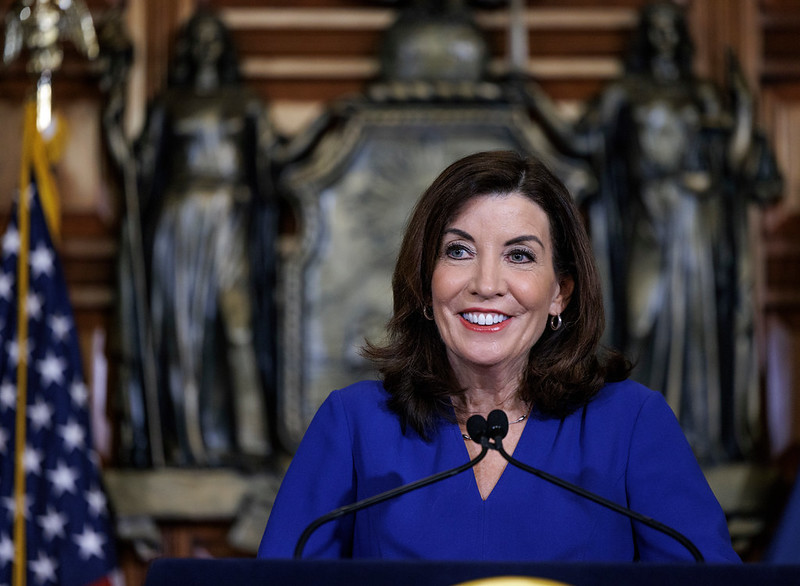While the state legislature votes on several bills that make up the state budget Friday, many lawmakers expressed misgivings about the nearly finalized budget deal between their body and Gov. Kathy Hochul.
Hochul announced a “conceptual” deal on a $220 billion – $4 billion more than her original proposal in January – budget for the coming fiscal year, a deal that came to fruition nearly a week after the budget’s April 1 deadline.
Assemblyman Bobby Carroll (D – Brooklyn) said that while he wasn’t happy with how Hochul ran this year’s budget negotiations, he felt legislators won several of the policy items they wanted.
“I am disappointed in the behavior of the governor generally,” Carroll said. “ I’m happy that the Assembly tried to hold the line on important issues like discovery. And making sure that we did things like get serious contributions for child care, for the environment, our schools and trying to solve fair pay for homecare workers.”
In addition to these investments, the budget also gave large allocations to the CUNY and SUNY systems, building affordable housing and tax relief for small businesses.
Among the policy items included in the budget were a suspension of the state’s gas tax amid the war in Ukraine and allowing businesses to once again sell alcohol to-go. The latter proposal is something Assemblywoman Jessica Gonzalez-Rojas (D – Queens) said will be crucial for businesses in her northwest Queens district.
“I have the best restaurants in New York City,” Gonzalez-Rojas said. “And those restaurants often depend on programs to help them and one of them is alcohol to-go, which I’m grateful to be able to deliver back to the community.”
Carroll said he also wasn’t pleased that $600 million in taxpayer money was earmarked in the budget for building a new stadium to house the Buffalo Bills, something Hochul proposed only days before the budget deadline. Assemblyman Peter Abbate (D – Brooklyn), on the other hand, said that while he wasn’t happy with the stadium deal, he thought the legislature got a fair deal in exchange.
“You know, it’s a tough decision, I’m sure we could’ve used the money,” Abbate said. “But the legislature got $4 billion added to the budget. So, it’s a three way deal. She got $600 million, and we got 4 billion for projects that help my constituents. So it’s not that bad of a deal.”
The item most responsible for stopping the budget from being passed on time, was a slate of changes to criminal justice reforms enacted in recent years – including bail, discovery and “Raise the Age” reforms – that Hochul proposed at the 11th hour.
Ultimately, many of the changes Hochul proposed made it into the final budget deal. The changes to bail reforms passed in 2019 include making a defendants’ criminal histories – including their history of gun use, the seriousness of their offense and whether they violated an order of protection bail eligible.
Additionally, the changes also make it so judges can set bail for anyone who’s rearrested with an outstanding desk appearance ticket.
Assemblywoman Latrice Walker (D – Brooklyn) said she was a strong opponent of these changes because she believes the 2019 bail reforms were a necessary step towards improving the criminal justice system that’s disproportionately populated by Black and brown people.
“We made significant changes in 2019 to take poverty out of jail because there were too many people who were being arrested and held behind bars and ultimately, as we’ve seen over the course of 2021 and 2022, have made the ultimate sacrifice due to those injustices. Where 19 people died incarcerated pretrial, while still awaiting their cases to be heard, or their day in court,” Walker said.
“And so, we had a dismantling of that unjust system where some people were able to pay their way out to be in a position of control and authority with respect to the defense of their cases. And others were made to languish behind bars in inhumane conditions, particularly within Rikers Island,” she added.
Walker took particular issue with what she characterized as ambiguous language in the changes, like allowing judges to consider “harm,” which she said is an “undefined term within the law.”
“Whenever we have this conversation about harm, and looking at charges, we know that there’s a certain level of over policing in certain communities as opposed to others and most of those communities are Black and brown,” Walker said. “So, we believe that utilizing these changes will continue the disproportionate number of Black and brown people who will be incarcerated. These changes are duplicate. We are already allowed to look at the charges against someone when making an assessment of the amount of bail to set. But this adds this additional harm, which is again undefined, and which will allow for judges from Brooklyn to Buffalo to make varying decisions about what harm includes.”
Walker has made headlines for the past couple weeks for going on an 18-day hunger strike calling for the legislature not to give into making changes to criminal justice reforms. She told PoliticsNY she’ll be ending the hunger strike Friday, once all of the budget bills have passed.
“It has been a tumultuous experience, the hunger pains, back pain, the headaches, the craving was all worth it to me,” Walker said. “It allowed me a certain level of clarity, of foresight, of vision through this process. It intensified my commitment.”






